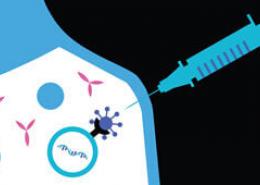Are You Familiar with AFib Symptoms and the Increased Risk of Stroke Associated with the Condition?

MRNA VS. CONVENTIONAL VACCINES

Meet our new Chief Patient Officer, Dr. Dara Richardson-Heron

Working Together to Empower Women

Reducing Health Disparities in Latino Communities

Pfizer Women’s Resource Group

Universal vs. Single Payer Healthcare

Learn about some symptoms of AFib with the No Time to Wait campaign, which aims in part to raise awareness about symptoms of the condition and the importance of talking to a healthcare provider if experiencing symptoms.
Did you know that symptoms such as chest pain, light headedness or irregular heartbeat could be an indicator of a potentially serious condition?1 Although these symptoms could be perceived as minor, they could be due to atrial fibrillation, also known as AFib, or something else. AFib is the most common type of irregular heartbeat, so it is important to be familiar with the symptoms and risk factors, although only a healthcare provider can make a proper diagnosis.1 These four AFib facts can help familiarize individuals with AFib symptoms and increase knowledge of the condition to better help determine if they should talk to a healthcare provider.
1. AFib is the most common type of irregular heartbeat.1
Even though AFib is the most common type of irregular heartbeat, it can potentially be serious given it is associated with an increased risk of stroke.1 AFib occurs when the upper chambers of the heart beat irregularly and do not pump all of the blood to the lower chambers, causing some blood to pool and potentially form clots.1,2
2. AFib increases a person’s risk of stroke by ~5 times.3,4
If a clot breaks loose, it can travel through the bloodstream to the brain and lead to a stroke.2 Those with AFib are approximately five times more likely to experience a stroke, which makes the condition potentially serious.3,4AFib-related strokes are likely to be more severe than strokes that result from other conditions.1,3,5
3. There are a variety of symptoms related to AFib.1
AFib symptoms may include irregular heartbeat, heart palpitations, shortness of breath, chest pain, light headedness or fatigue, among others and can be evidence of a potentially serious condition such as AFib.1 These symptoms can also be associated with other conditions not related to AFib. Only a healthcare provider can determine whether these symptoms indicate AFib or another condition.
4. It is estimated that by 2030, approximately 12 million people in the U.S. will have AFib.6
In 2021, approximately 8.7 million people in the U.S. are estimated to have AFib and it is projected that the condition is growing in prevalence as the U.S. population ages, with approximately 12 million people in the U.S. projected to have AFib by 2030.6 It’s important to be aware of the risk factors for AFib, including but not limited to advancing age, heart disease and high blood pressure, as they increase the chances of developing the condition.1
AFib is no minor matter due to an increased risk of stroke associated with the condition.1 Being proactive about your health and seeking medical attention early may help reduce the chance of AFib leading to something more serious, so if you are experiencing symptoms, talk to your healthcare provider by phone, online or in person – this is no time to wait. The Alliance encourages people to visit www.notimetowait.com/afib-explained, where they can find additional information about AFib and symptoms that could be associated with the condition.
+++
Source: Read Full Article